The Productivity Gap Nobody Measured.
Executives claim AI saves 8 hours weekly. Workers report under 2. Apple bets on wearable AI. Anthropic publishes 80-page philosophy for Claude.
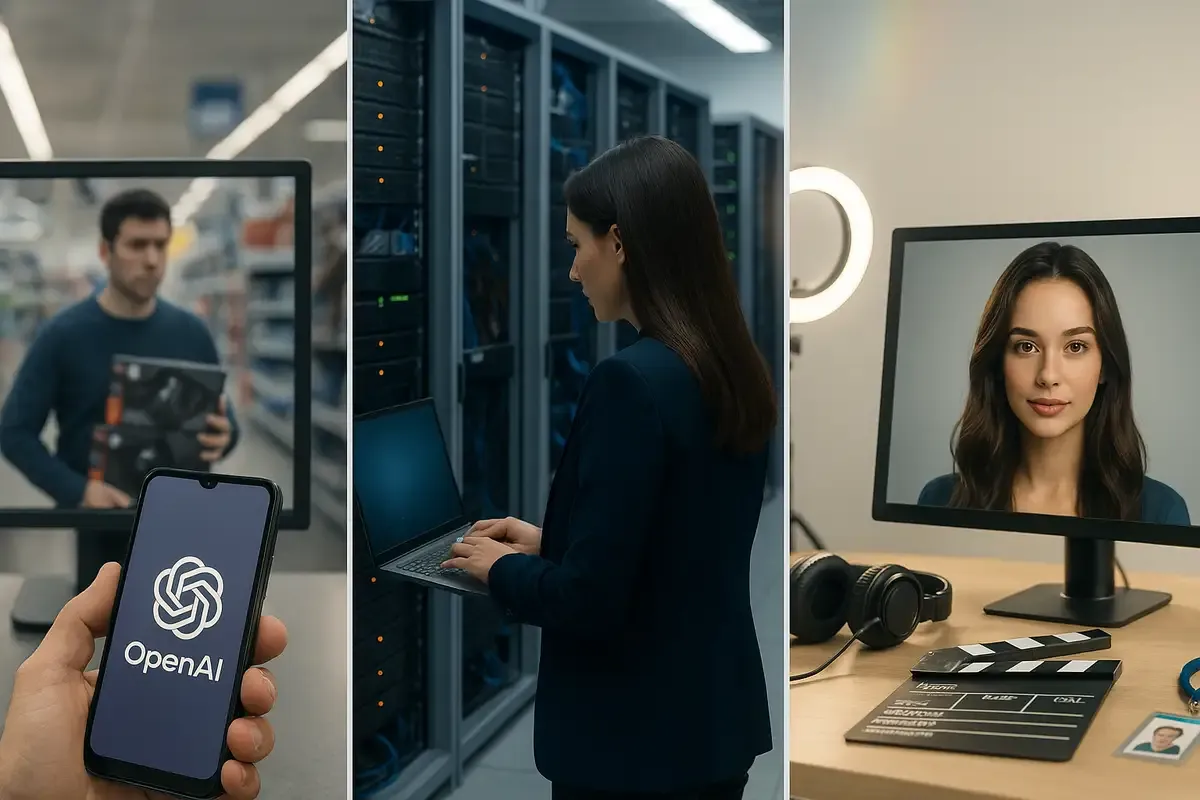
Good Morning from San Francisco,
Sam Altman's digital twin shoplifted GPUs from Target this week. Not the real Sam—his AI doppelgänger, generated by OpenAI's new Sora 2 app. Within hours, users flooded feeds with Pikachu and SpongeBob. Disney opted out immediately. Warner Bros. stayed silent.
Meanwhile, six OpenAI veterans raised $12 billion to help researchers customize models instead of building bigger ones. Mira Murati thinks fine-tuning beats scale. Princeton's theorem-provers agree.
Hollywood agents tried signing an actress who doesn't exist. SAG-AFTRA refused to use "she" pronouns. Emily Blunt called it "really, really scary." The creator compared her creation to puppetry. Actors weren't buying it.
Stay curious,
Marcus Schuler
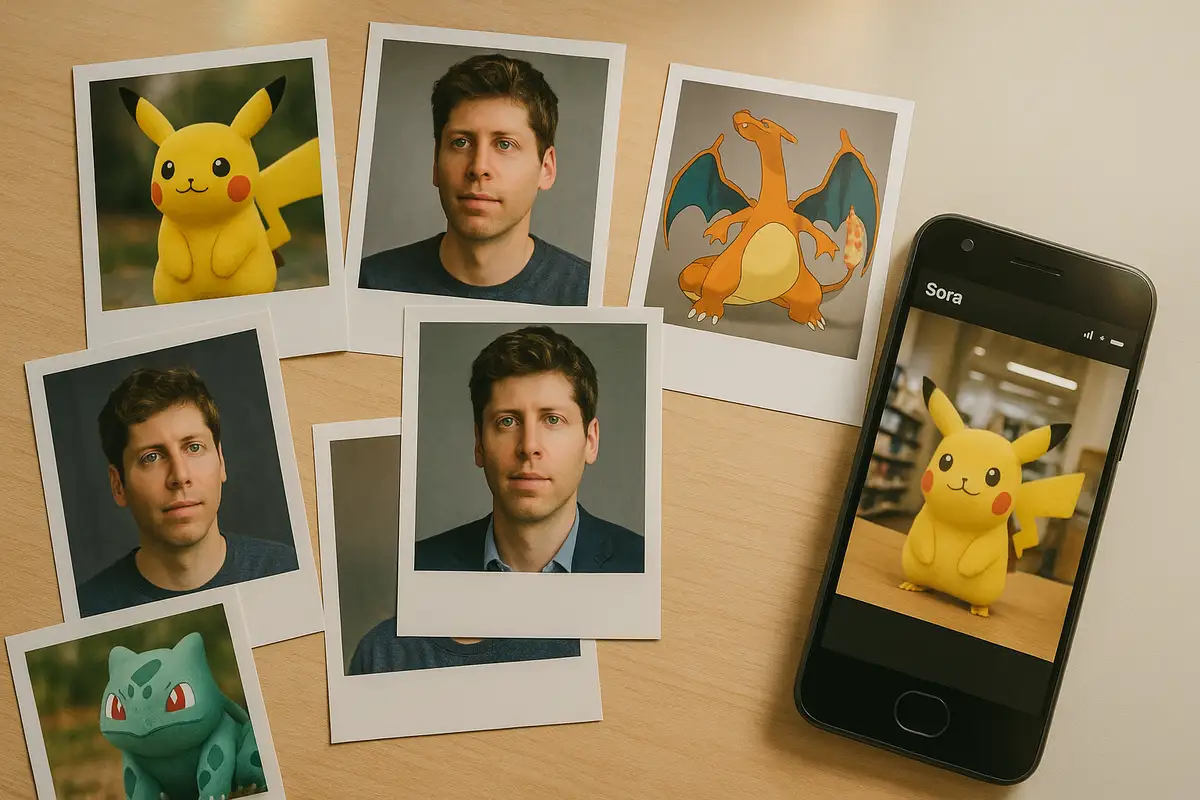
OpenAI's Sora 2 launched Tuesday with an inverted copyright model: rightsholders must opt out, not opt in.
Within 24 hours, the TikTok-style app hit number one in iOS App Store rankings while feeds filled with Pikachu, SpongeBob, and Mario—characters the model was clearly trained on. Disney opted out immediately. Warner Bros. and Sony Music didn't respond.
The technical leap is real. Sora 2 generates 60-second videos with synchronized audio and improved physics. The "Cameo" feature inserts verified likenesses into AI scenes. CEO Sam Altman made his available to all users, spawning viral videos of him shoplifting GPUs from Target.
UCLA law professor Mark McKenna draws a sharp line: training AI on copyrighted material may qualify as fair use, but "outputting visual material is a harder copyright question." OpenAI faces existing lawsuits from authors and The New York Times. Competitor Anthropic settled similar claims for $1.5 billion.
The safeguards are weak. Watermarks can be cropped. Metadata indicating AI generation disappears across platforms. Users can't delete exported copies featuring their likeness.
Why this matters:
• The opt-out model shifts enforcement burden to rightsholders while OpenAI benefits from training on protected works—legal precedent hasn't caught up to this strategic inversion of standard practice
• Deepfake accessibility at this quality level, paired with frictionless social distribution, fundamentally changes information verification dynamics regardless of internal safeguards or watermarking approaches
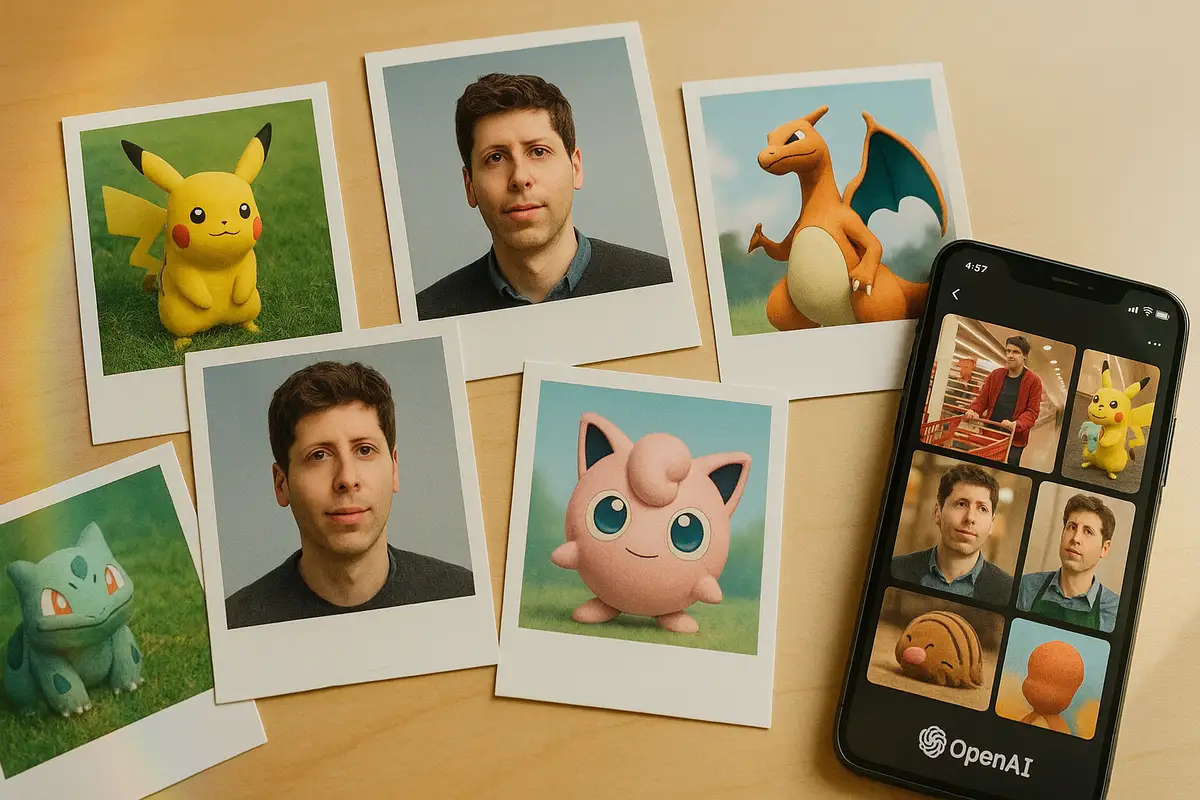


Prompt:
A black and white high-end beauty portrait photograph of a striking African woman with classic beauty features and an air of quiet power. She has a sculpted facial structure, characterised by high, prominent cheekbones, a defined jawline, her lips are full. Her hair is cut very short. Her expression is intense and direct, with a powerful, unwavering gaze that looks straight into the camera. There is an element of seriousness or deep focus, giving the portrait a strong, editorial quality. The image is a tight, vertical close-up portrait centred on the model's face, cropped just above the collarbone and retaining minimal background, White back ground. It is high-resolution with extremely sharp focus. Use a medium to long telephoto lens. A large, soft light source is positioned high and slightly in front of the model, creating subtle, soft shadows under the chin and nose. A large reflector or secondary light is used below the chin, softening the shadows cast by the key light and providing a nice lift and highlight on the lower lip and neck. The image exhibits a high-contrast yet smooth tonal range in the grayscale. Smooth Tonal Transition: Despite the contrast, the mid-tones, especially on the skin, transition very smoothly.

Mira Murati's Thinking Machines Lab launched Tinker Wednesday—a managed API that automates frontier model fine-tuning.
The company raised $2 billion at a $12 billion valuation before shipping. That price signals conviction: the next fortunes come from helping others customize existing models, not building bigger base ones.
The team matters. John Schulman invented the RLHF techniques behind ChatGPT. Barret Zoph, Lilian Weng, Andrew Tulloch, Luke Metz—specialists across pretraining, safety, post-training. They left OpenAI's closed strategy to build this.
Tinker uses LoRA adapters so multiple fine-tuning jobs share base model weights, cutting costs and iteration time. It supports models from Meta's Llama to Alibaba's 235-billion-parameter Qwen architectures. Early users include Princeton's theorem-proving team, Stanford chemistry researchers, Berkeley's SkyRL group.
Access is invite-only during private beta with manual safety vetting. Free now; usage-based pricing launches soon.
Why this matters:
• Value migration hypothesis: If customization matters more than capability development, infrastructure companies capture economic surplus previously held by labs training base models—inverting current power structures.
• Strategic positioning through access: The closed versus open debate reflects competing bets on where value accumulates. Making frontier fine-tuning techniques accessible builds market position differently than hoarding base model capabilities.

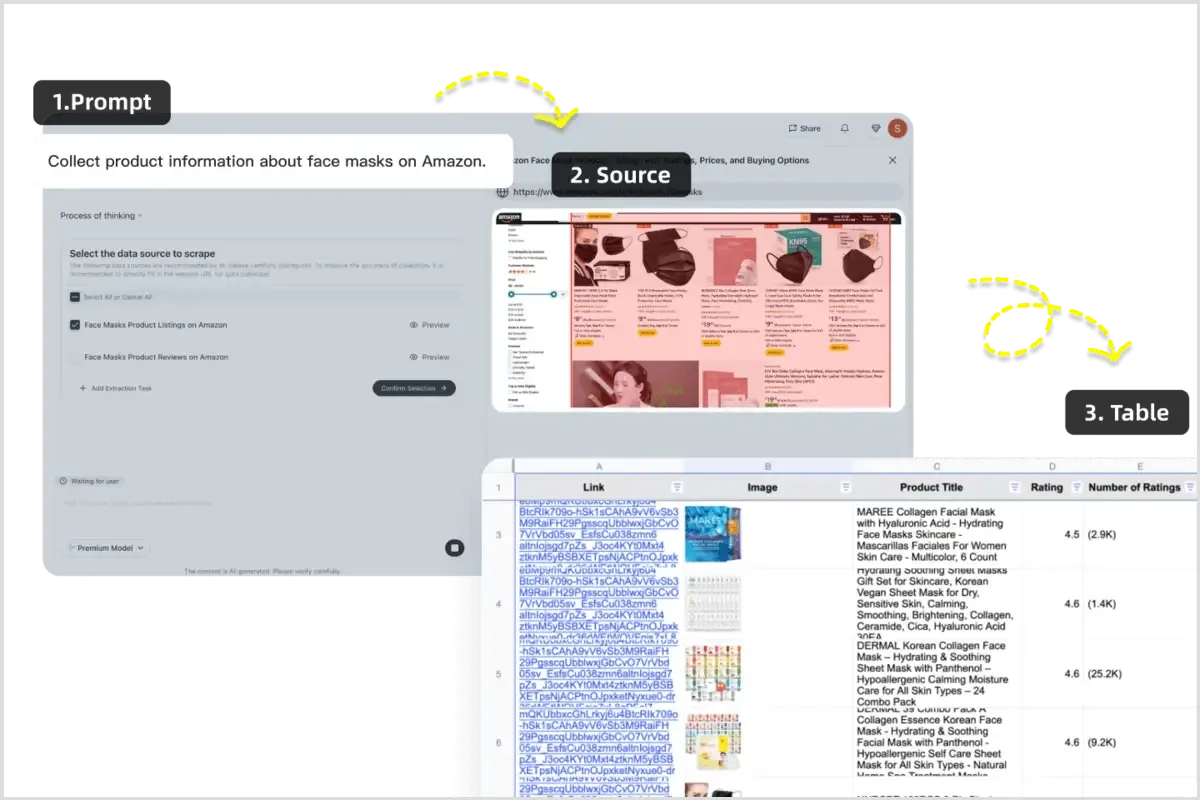
Capalyze pulls data from any website into spreadsheets and answers your questions about it in plain English. Extract leads, compare products, analyze reviews, and create charts without writing code or formulas.
Tutorial:
Join 10,000 readers who get tomorrow's tech news today. No fluff, just the stories Silicon Valley doesn't want you to see.
Analyze [my audience]—what they fear, want, and care about. Review my draft and identify:
Then rewrite the weak sections to match how they think.
1. Fill in the audience
Replace [my audience] with who you're writing to. Be specific—not "investors" but "Series A investors who care about unit economics" or "busy HR managers who've tried wellness programs before."
2. Paste your draft
Drop in whatever you've written—email, pitch, memo, social post. The whole thing or just the parts you're unsure about.
3. What you'll get back
The analysis comes in two parts:
Part one: A breakdown of how your audience will react
Part two: Rewritten sections that fix the problems
OpenAI has completed a secondary share sale allowing employees to sell approximately $6.6 billion worth of company stock at a record $500 billion valuation. This transaction makes OpenAI the world's most valuable startup, surpassing SpaceX's previous valuation record.
Silver Lake co-CEO Egon Durban has emerged as a key figure in private equity's tech sector consolidation, having brokered a massive $55 billion takeover of Electronic Arts in partnership with Jared Kushner. The deal represents the latest in a series of high-stakes transactions by the private equity firm, which has been actively pursuing major acquisitions across the technology landscape, including previous deals involving TikTok, Altera, and Endeavor.
German artificial intelligence language platform DeepL is exploring a potential initial public offering in the United States, with sources indicating the company may seek a valuation of up to $5 billion. The move comes after DeepL raised $300 million in 2024 at a $2 billion valuation, positioning the Google Translate competitor for significant growth as it considers entering public markets.
Volkswagen has announced a "complete reset" of its struggling software division Cariad, forming new partnerships with Chinese automaker Xpeng and US electric vehicle company Rivian as part of what the company calls a "massive transformation." The German automaker is implementing this strategic overhaul as it seeks to better compete with Tesla and emerging Chinese electric vehicle rivals in the rapidly evolving automotive software market.
China is experiencing a significant push to integrate artificial intelligence tools into children's daily lives, with government support and profit-driven tech companies leading the adoption of robot tutors, chatbots, and other AI-powered educational and caretaking technologies. Despite this rapid integration, educators and researchers remain skeptical about the initiative, warning that the promised benefits of these AI tools for children may be overstated and lack sufficient evidence to justify their widespread implementation.
Universal Music and Warner Music are approaching landmark licensing agreements with major technology companies including Google, Spotify, ElevenLabs, Stability AI, and Suno to allow AI use of their music catalogs. The music industry giants are seeking payment structures similar to streaming royalties as they prepare for increased disruption from artificial intelligence technologies in the music sector.
Public records reveal that Amazon Web Services is actively marketing artificial intelligence surveillance technology to law enforcement agencies through partnerships with companies like Flock Safety and ZeroEyes. The tech giant is promoting a range of AI-powered tools including drone surveillance systems, automated gun detection technology, and real-time crime monitoring centers to police departments across the country.
Medical startups are increasingly deploying artificial intelligence and robotic technology to assist with in vitro fertilization procedures, with these automated systems helping to facilitate embryo fertilization processes. According to reports, these technological interventions have contributed to at least 20 successful births, representing an early milestone in the application of AI and robotics to reproductive medicine.
Restaurant app entrepreneur Steven Simoni, who previously sold his company Bbot to DoorDash for $125 million, has co-founded Allen Control Systems, a defense technology company that develops AI-powered gun turrets specifically designed to intercept and shoot down drones. The Silicon Valley entrepreneur is building momentum for his defense venture through strategic marketing efforts including high-profile events, podcast appearances, and promotional campaigns to attract Pentagon attention and contracts.
Oneleet, a cybersecurity company that provides integrated compliance services including penetration testing and code scanning, has raised $33 million in Series A funding led by Dawn Capital. The startup has achieved $3 million in annual recurring revenue as it works to streamline security compliance processes for businesses through its comprehensive platform approach.
Japanese beer giant Asahi reports that most of its 30 factories across Japan have ceased operations since September 29 following a cyberattack on its systems. The production halt threatens to create a shortage of Asahi Super Dry, Japan's most popular beer brand, with existing stock expected to last only a few more days.
The extortion group Crimson Collective has claimed responsibility for breaching Red Hat's private GitHub repositories, allegedly stealing approximately 570 gigabytes of data from 28,000 projects. Red Hat has confirmed that a security incident occurred, though the full extent and impact of the breach remain under investigation.


Particle6's AI division Xicoia created Tilly Norwood—a photorealistic digital actress—using 10 AI tools and announced in September 2025 that talent agencies were negotiating to represent her.
Within 48 hours, SAG-AFTRA issued a formal condemnation. The union refused to use "she" pronouns, calling Norwood "it" and "a character generated by a computer program," emphasizing the terminology determines whether she's software or talent under union contracts.
Actors from Emily Blunt ("really, really scary") to Melissa Barrera (suggested boycotting any agency signing AI clients) revolted. Particle6 claims 90% cost reduction versus traditional production—Norwood requires no salary, insurance, or union negotiations.
Creator Eline Van der Velden defended her as "not a replacement but a creative work," comparing her to puppetry. The speed of rejection reveals where Hollywood draws the line: AI can assist production, but substituting for human performance triggers existential resistance.
Why this matters:
• Labor leverage depends on scarcity—if studios believe synthetic performances are adequate, negotiating power shifts permanently before the technology fully matures
• Definitions precede regulation—whether Norwood is "software" or "talent" determines copyright, contracts, and liability frameworks for the next decade of AI integration

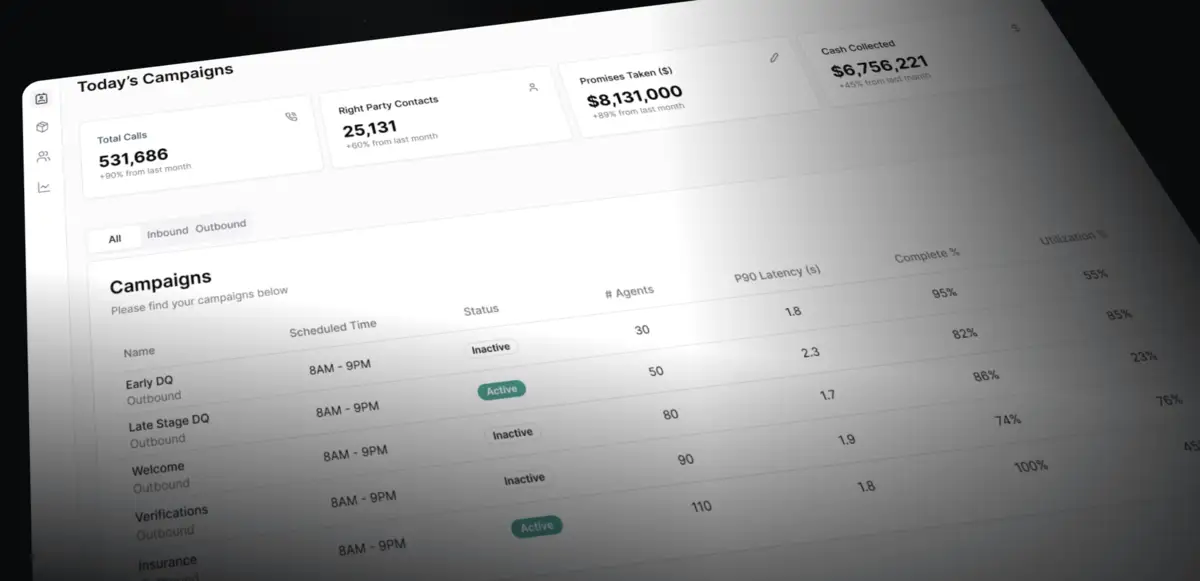
Salient builds AI agents that call delinquent borrowers at 7 a.m. and collect money. The company turned loan servicing—one of finance's most regulated, manual workflows—into a voice-first automation play.
The Founders
Ari Malik (CEO) and Mukund Tibrewala (CTO) launched in 2023 out of YC's Winter batch. Malik comes from Tesla sales finance and DST Global. Tibrewala shipped code at Airtable and Dropbox. Based in San Francisco. The duo literally moved cities to stand up early deployments in person—forward-deployed software in the wild. 🚀
The Product
Voice agents that talk, text, and chat with borrowers across every channel. They collect payments, negotiate extensions, update insurance, and quote payoffs—all while tracking FDCPA, TCPA, and CFPB rules in real time. The stack integrates with legacy loan systems (OFSLL, Shaw, Nortridge) and processors (Stripe, ACI). SOC 2 and PCI Level 1 certified. Claims $1B+ collected, 39M+ interactions, and 60% handle-time cuts. Works when call centers sleep.
The Competition
Prodigal and Skit.ai sell similar agent platforms. TrueAccord runs digital-first collections without heavy voice. Decagon pitches horizontal AI support into regulated verticals. Salient differentiates on compliance depth—monthly rule updates, audit trails, domain obsession.
Financing
$60M Series A in July 2025, led by a16z. Matrix, YC, and Michael Ovitz joined. Reports peg valuation near $350M. Breathing room to chase downstream servicing workflows.
The Future ⭐⭐⭐⭐
Four stars. Compliance is a moat, not a headwind. Regulation tightens; Salient designed for it. The field will crowd—voice AI money moves fast—but lenders demand proof, not demos. If the metrics hold (resolution rates, payment completion, clean audits), Salient moves from "forward-deployed" to "click-to-deploy." Security and synthetic-voice fraud remain open questions. 🎯
Get the 5-minute Silicon Valley AI briefing, every weekday morning — free.